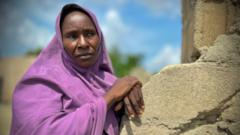How Can Communities Rebuild After a Fatal Dam Collapse?

Published: 2025-09-11 10:00:29 | Category: world
The threat of flooding in Maiduguri, Nigeria, is a pressing concern as residents remember the devastation caused by last year's torrential rains and dam collapse. Many are still coping with the aftermath, facing ongoing challenges such as lack of shelter, food, and medical supplies. With millions displaced and infrastructure in disrepair, the community is bracing for another potential disaster.
Last updated: 02 October 2023 (BST)
Key Takeaways
- Flooding in Maiduguri has affected over two million people, leading to significant loss of life and property.
- The Borno state government has initiated reconstruction of the dam and provided some aid, but many residents report inadequate support.
- The ongoing insurgency by Boko Haram complicates recovery efforts and infrastructure maintenance.
- Residents continue to face challenges such as inadequate shelter, food scarcity, and disruptions to education.
- As the rainy season approaches, fears of further flooding persist among the displaced population.
The Context of Flooding in Maiduguri
Maiduguri, the capital of Borno State in north-eastern Nigeria, has long been plagued by flooding, particularly during the rainy season. The catastrophic events of last year, which resulted in at least 37 fatalities and the displacement of around two million people, have left deep scars on the community. Many residents still live in makeshift shelters, grappling with loss and uncertainty.
Impact of Last Year’s Floods
The floods that struck Maiduguri last year were exacerbated by the collapse of the Alau dam, a critical infrastructure project that has faced neglect due to the ongoing insurgency. The dam, built in 1986, has been poorly maintained, leading to its failure during heavy rains. Mohammed Shettima, head of the engineering department at the Chad Basin Development Authority (CBDA), highlighted how the dam's deterioration contributed to the catastrophe.
Government Response and Support Initiatives
In the wake of the floods, the Borno state government has claimed to provide assistance to affected communities through the establishment of relief camps, food distribution, and cash handouts. However, many survivors like Sa'adatu Dahiru express disappointment over the lack of sustained support. Dahiru, who lost her two-year-old son during the floods, received a one-time payment of 10,000 naira (approximately £5), but no further assistance has followed.
Challenges Facing the Displaced Population
The aftermath of the floods has posed numerous challenges for the displaced population. Many families, like that of Maryam Jidda, who fled violence from Boko Haram only to be hit by floods, find themselves living in temporary shelters with insufficient food and clean water. Jidda, now in her 70s, reflects on the immense loss she has suffered, including the memories of her family.
Education and Employment Disruptions
The flooding has profoundly impacted education and employment opportunities for young people in Maiduguri. Ali Kadau, a 21-year-old whose mechanic workshop was destroyed, shares his struggle to find work. With his previous skills rendered useless and no means to pursue further education, many youths are left feeling hopeless and stagnant.
The Role of Boko Haram in the Crisis
The ongoing insurgency by Boko Haram has not only hindered infrastructure development but also complicated the delivery of aid. Attacks in the region have instilled fear among residents and limited access to relief efforts. The violence has created additional layers of trauma for those already suffering from the consequences of natural disasters.
Funding and Infrastructure Rebuilding Efforts
The Borno state government has outlined a financial plan to address the crisis, including a request for an additional 61 billion naira (£13 million) for rebuilding infrastructure like roads and hospitals. However, there are concerns that funding may only be approved in response to another disaster, leaving communities vulnerable in the meantime.
Future Outlook: Preparedness for the Next Rainy Season
As the rainy season approaches its peak, many residents are anxious about the possibility of further flooding. The government's priority has been to improve drainage systems and prevent overflow, yet the tangible results of these efforts remain to be seen. For survivors like Dahiru and Jidda, the question looms large: how can they rebuild their lives amidst such uncertainty?
Community Resilience and Recovery
Despite the overwhelming challenges, there are signs of resilience within the Maiduguri community. Various local and international aid agencies continue to provide support, and the government is working on initiatives to rehabilitate boreholes and address water scarcity. However, the community's long-term recovery hinges on sustained government commitment and effective management of resources.
Conclusion
The situation in Maiduguri is a poignant reminder of the complex interplay between natural disasters and human conflict. As residents face the dual threats of flooding and violence, their stories highlight the urgent need for comprehensive recovery plans that prioritise both immediate relief and long-term resilience. With the rainy season intensifying, will the government act swiftly enough to prevent another disaster? Only time will tell.
FAQs
What caused the flooding in Maiduguri last year?
The flooding in Maiduguri last year was primarily caused by torrential rains and the collapse of the Alau dam, which failed due to years of neglect exacerbated by the Boko Haram insurgency.
How many people were affected by the floods in Maiduguri?
Approximately two million people were displaced due to the floods, with at least 37 fatalities reported and significant destruction of homes and businesses.
What assistance has the Borno state government provided?
The Borno state government has claimed to provide cash handouts, food aid, and establish relief camps for the affected population, though many survivors report insufficient support.
How is the Boko Haram conflict impacting recovery efforts?
The Boko Haram insurgency complicates recovery efforts by creating security challenges that hinder aid delivery and infrastructure maintenance, leaving communities vulnerable and exacerbating their suffering.
What measures are being taken to prevent future flooding?
The government is focusing on improving drainage systems and desilting rivers to manage water overflow. However, the effectiveness of these measures remains to be seen as the rainy season progresses.



